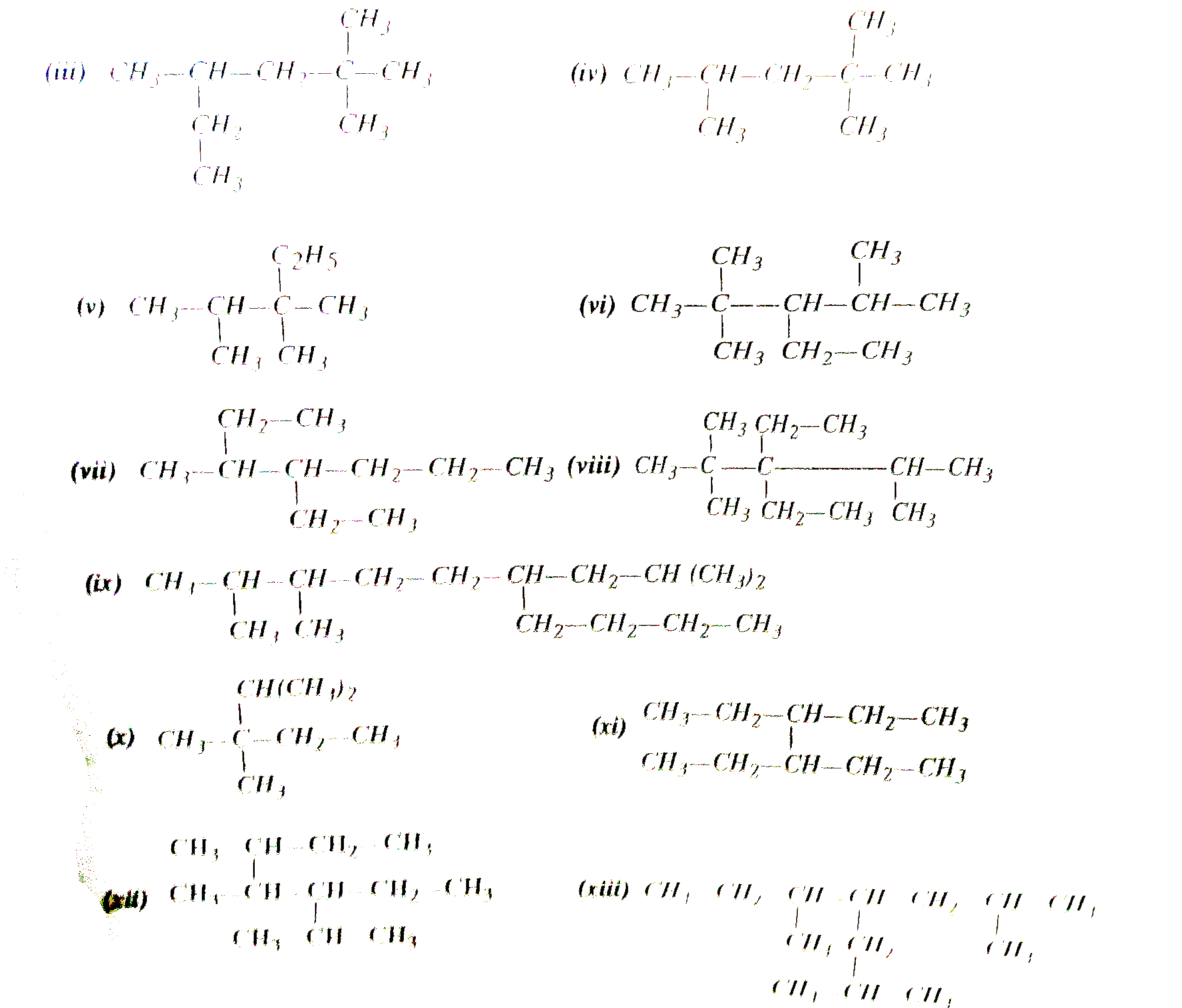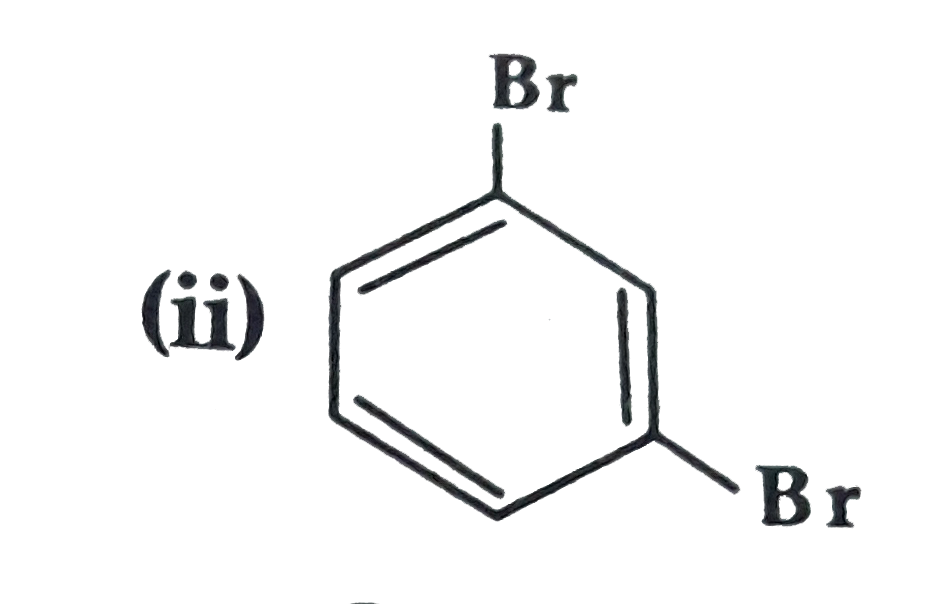Give the IUPAC names for each of the following :
(i) (CH3CH2)2CHCH(CH3)CH2CH3
(ii) (CH3)4C
(iii) [(CH3)3C]4C
(iv) (CH3)3CCH2C(CH3)3
Strategy: Select as the parent structure the longest possible continous chain and then consider the compound to have been derived from this structure by the replacement of H atoms by ends of the longest chain, begin numbering at the end nearest to the branch that is first in alphabetical order.
3. Assign the name and position number to each substituent. Arrange the substituents in alphabetical order. Hyphenated prefixes such as tert- sec- are not used in the alphabetization of substituents.
4. Use on appropriate prefix to group like substituents: di=2, tri=3, tetra=4 penta= 5, and so on. Do not consider these prefix when alphabetizing attached groups.
5. Write the name as single word. Use hyphens to separate numbers and letters (plus some hyphenated prefix) and commas to spearate numbers. Do not leave any spaces.
Some examples showing the application of the rules of nomenclature are given below:
C (iv) (CH(3))(3)C CH(2)C (CH(3))(3) Strategy: Select as the parent structure the longest possible continous chain and then consider the compound to have been derived from this structure by the replacement of H atoms by ends of the longest chain, begin numbering at the end nearest to the branch that is first in alphabetical order. 3. Assign the name and position number to each substituent. Arrange the substituents in alphabetical order. Hyphenated prefixes such as tert- sec- are not used in the alphabetization of substituents. 4. Use on appropriate prefix to group like substituents: di=2, tri=3, tetra=4 penta= 5, and so on. Do not consider these prefix when alphabetizing attached groups. 5. Write the name as single word. Use hyphens to separate numbers and letters (plus some hyphenated prefix) and commas to spearate numbers. Do not leave any spaces. Some examples showing the application of the rules of nomenclature are given below: various alkyl groups as substituents. To avoid any mistake. it is always better to write the complete structural formula.](https://d10lpgp6xz60nq.cloudfront.net/physics_images/RS_P1_CHM_C16_S01_001_Q01.png)
various alkyl groups as substituents. To avoid any mistake. it is always better to write the complete structural formula.
Video Solution
Text Solution
(i) 3-Ethyl-4-methylhexane
(ii) 2,2-Dimethylepropane
(iii) 3,3-Di-tert-butyl-2,2,24,4-tetramethylpentane
(iv) 2,2,4,4-tetramethylpentane
Once we are able to write the correct IUPAC name for a given structure, the next important step is to write the correct structrue from the given IUPAC names. Essentially, the rules are as followes:
1. Write the longest possible continous chain of C atoms describing the parent alkane.
2. Number the parent C chain.
3. Attach time different alkyl groups (substituents) to the correct C atoms.
4. Satisfy the valence of every C atom by putting the correct number of H atoms.
4. Satisfy the valence of every C atom by putting the correct number of H atoms.
Let us apply these guidelines to write the correct structure of 4-ethyl −2,3,5 tertramethylexene.

To understand the common names of alkanes and the relative reactivities of the various parts of an alkane molecule, it is extremely important to understand the different classes of C and H atom. A primary (1∘) carbon atom is attached to only one other carbon atom, a secondary (2∘) is attached to two others, a tertiary (3∘) to three others, and a quaternary (4∘) to four others.
Similarly, each H atom is clasified given the same disignation of primary, secondary, or tertiary as the C atom to which it is attached.

|
Topper's Solved these Questions
Similar Questions
Knowledge Check
The IUPAC name of the following compound
CH3−C(CH3)2−CH=C(CH3)2 isA1,1,3,3-Tetramethylbut-1-eneB1,3,3-Trimethylpent-2-eneC2,2,4-Trimethylbut-4-eneD2,4,4-Trimethylpent-2-eneThe IUPAC name of the following structure is [CH3CH(CH3)]2C(CH2CH3)C(CH3)C(CH2CH3)2
A3,5−diethyl−4,6−dimethyl−5−[1−methylethyl]3−hepteneB3,5−diethyl−5−isopropyl−4,6−dimethyl−2−hepteneC3,5−diethyl−5−propyl−4,6−dimethyl−3−hepteneDNone of theseThe IUPAC name of the following structure (CH3)C.C.C.(CH3)CH(CH3) is:
A3-methylhex-4-yn-2-eneB3-methylhex-2-en-4-yneC4-methylhex-4-ene-4-yneDAll are correct
Write the IUPAC names of the following compounds
(i) CH3−CH−CH−CH3 | | C2H5 C2H5
(ii) (CH3)3CC2H5

View SolutionGive the IUPAC names of the following compounds:
(i) CH3−C∣BrH−CH2−CH3
(ii)
(iii) CH2=CH−CH2−Cl
View SolutionThe IUPAC name of the following structure
(CH3)CCC(CH3)CH(CH3) is
View SolutionThe IUPAC name of the following compound is
(CH3)2CH−CH2CH=CH−CH=CH−CHCH3 | C2H5
View SolutionIUPAC name of the following compound
H3C−CH2−CH−CH2−CH−CH2CH3 | | CH2CH3 CH3
is
View Solution
